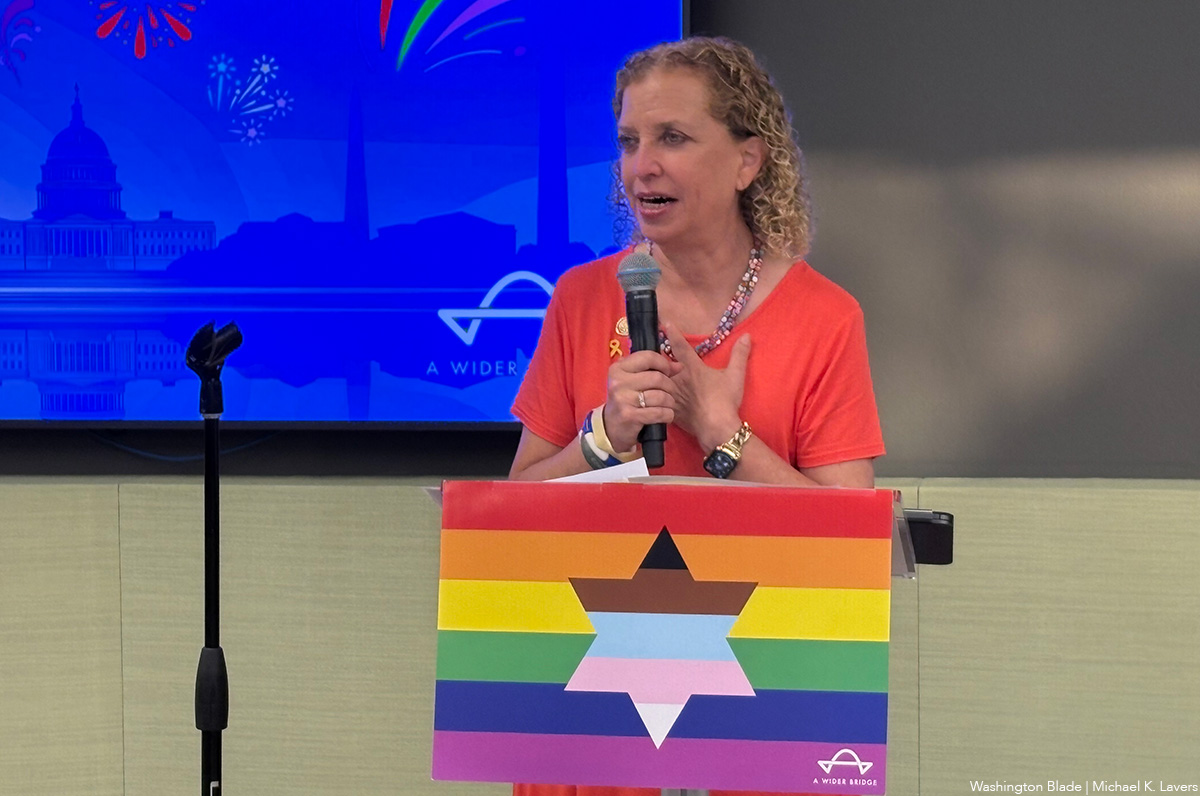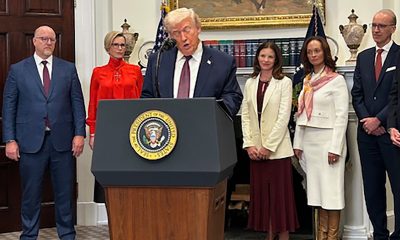National
Trans advocate picked to lead LGBT military group
Robinson says she had to ‘deny truths’ to continue service

Two organizations dedicated to assisting LGBT service members have merged to take on the issues of the post-“Don’t Ask, Don’t Tell” military and have designated a new leader who personifies a lingering inequity that remains for the armed forces.
OutServe-SLDN named as its new executive director Allyson Robinson — a 1994 graduate of the U.S. Military Academy at West Point who, as an Army officer, commanded PATRIOT missile units in Europe and the Middle East — as it officially completed its merger last week at its International Leadership Conference in Orlando, Fla.
The Scranton, Pa., native is a transgender veteran and the only openly transgender head of a major national organization dedicated to serving the LGBT community.
Speaking to the Washington Blade from the conference last week, Robinson said she didn’t transition until she left active duty, but still felt like she had to “deny truths” about herself during her service.
“I came from a military family and had that value of service above self, or service to the country that has given me so much,” Robinson said. “I had that value ingrained in me from the time I was a child. To be in a position in order to carry out that value, I had to violate another value that I held very deeply — that value of honestly and integrity. It was an ugly thing.”
Robinson said she didn’t identify as transgender while in service during the 1990s because at that time, she wasn’t aware of the terminology to describe her gender identity, although she was aware of pioneering leaders in the movement.
“I didn’t have language for what I experienced, or what my identity was because much of the language that we use today didn’t exist,” Robinson said. “But clearly, to steer into the heart of your question, I knew who I was. And I knew that in order to keep my career, and to serve the country I love, that I had to deny who I was.”
Unlike “Don’t Ask, Don’t Tell,” which was a law passed by Congress in 1993 to prevent openly gay people from serving in the military, the prohibition on openly transgender service is administrative. Those who identify as transgender are forced to take a medical discharge.
Robinson emphasized the difficulties that transgender people experience in concealing their identity while serving in the military.
“And in many ways, it’s even worse than the ‘Don’t Ask, Don’t Tell’ military because there is no ‘Don’t Ask, Don’t Tell,'” Robinson added. “People in the chain of command are completely authorized to ask, and if you don’t respond truthfully — if you perjure yourself — then there are penalties for that.”
Much in the same way LGBT advocates pointed to allied nations that allowed openly gay service during the effort to repeal “Don’t Ask, Don’t Tell,” Robinson said several allied countries have implemented openly transgender service with no adverse impact, including the United Kingdom, Great Britain and Australia.
Most recently, Robinson was the deputy director for employee programs at the HRC Foundation and drove the curricula designed to improve LGBT cultural competence in the workplace. She and her wife of 18 years live with their four children in Gaithersburg, Md.
Mara Keisling, executive director of the National Center for Transgender Equality, said she doesn’t have “in-depth” experience working with Robinson, but engaged with her in a limited capacity during her tenure at HRC.
“I think it’s about time we had a trans person running a non-trans national LGBT organization,” Keisling said. “But I’m assuming they hired her because of her talents and her experience and not because she’s trans, and not because that’s suddenly going to be the only thing they work on.”
Keisling added she hopes the appointment of Robinson will bring greater attention to the issue of transgender people being barred from service.
“That’s a very important issue for them to get to,” Keisling said. “There hasn’t yet been a lot of work on it and we need there to start being support on it, so I’m really hopeful about that.”
Robinson said the issue of transgender service is receiving greater attention and she wants more openly transgender service members and veterans to tell their stories to help enact change.
“This is so crucial,” Robinson said. “We saw it during the fight to repeal ‘Don’t Ask, Don’t Tell.’ It’s part of the work that we’re doing at OutServe-SLDN right now — getting out the stories of gay and lesbian service members who are still not receiving the same benefits, the same privileges as their straight counterparts. The stories are so crucial to winning these fights.”
At the same conference where the appointment of Robinson was formally announced, OutServe-SLDN came into existence as a result of the merger between two organizations: Servicemembers Legal Defense Network, which since 1993 has provided legal services to gay service members in the “Don’t Ask, Don’t Tell” era, and OutServe, which was founded as a Facebook group and rose to prominence during the fight to repeal the law.
SLDN’s board and OutServe’s board voted unanimously to complete the merger, which was first announced in July. Retired Navy Captain April Heinze, who previously served as co-chair of the SLDN board of directors will take the helm alongside Josh Seefried, co-founder and previously co-director of OutServe.
In a statement, Seefried said the merger would enable the groups to serve as a “strong, unified voice” before the Pentagon and White House on policy matters affecting gay service members.
“What began as a simple effort to tell our stories has grown into something we could never have imagined, and this combination represents the next step in that evolution,” Seefried said. “Each organization brings its own strengths to the fight for full LGBT military equality, and we are stronger together.”
Openly transgender service is but one of many goals that Robinson has said she wants to pursue as head of OutServe-SLDN. Also on the docket: getting the Pentagon to make an administrative change so gay service members with same-sex partners can obtain certain benefits; repeal of the Defense of Marriage Act so gay service members can offer health and pension benefits to their same-sex spouses; growth of the network of service members formerly under OutServe; and continuing to provide legal services to gay service members.
Still, for the big ticket items like equal benefits for troops and openly transgender service, Robinson said she wasn’t immediately able to offer a plan publicly to achieve those goals.
“I’ve been part of the work there at HRC for some time; we’re going to continue to work together,” Robinson said. “But in terms of what the specific strategies are, I don’t know that it’s in the movement’s advantage for me to put too many details out there.”
But as part of the effect to provide partner benefits to gay service members, Robinson said she wants to sit down with Pentagon leaders to ask them why they haven’t yet been implemented. At the time “Don’t Ask, Don’t Tell” was lifted last year, the Pentagon said it was going to examine these benefits — which include joint duty assignments, issuance of IDs, use of the commissary and family housing — but hasn’t yet taken action.
“The lives of gay and lesbian service members could be significantly improved — it couple happen today with a stroke of a pen — and yet, for some unfathomable reason, there is a dire lack of will to make that happen among the people whose charge it is to take care of service members and their families,” Robinson said. “I’m very, very eager to sit down with some of those people and ask them that very question.”
Robinson also said SLDN’s lawsuit against DOMA — McLaughlin v. Panetta — will remain a priority for the organization, even though the case has been halted at the district court level pending the outcome of the DOMA cases before the Supreme Court. Because of DOMA, gay service members are denied major benefits that can’t be implemented administratively, like health and pension benefits.
“DOMA hurts military families,” Robinson said. “And because of that, DOMA is a national security issue. And so, we see the repeal of the Defense of Marriage Act as something that is crucial not just to our members and their partners and their children, but that’s crucial to the security of this nation.”
And Robinson also said she plans to extend the network of LGBT service members under the organization from the more than 6,000 members in place and reach into the estimated 66,000 gay and lesbian troops that are currently in service.
“Just coming in from this chapter’s meeting that I’m in, I heard something from one of our leaders, our volunteer leaders that encouraged me,” Robinson said. “She said, ‘Our most important member is that young private, or young airmen out there — these are the lowest ranking soldiers in the U.S. military‚ who is gay, lesbian, bi or transgender and who doesn’t even know we exist and feels completely alone.’ As an organization, we exist for those people.”

A Wider Bridge on Friday announced it will shut down at the end of the month.
The group that “mobilizes the LGBTQ community to fight antisemitism and support Israel and its LGBTQ community” in a letter to supporters said financial challenges prompted the decision.
“After 15 years of building bridges between LGBTQ communities in North America and Israel, A Wider Bridge has made the difficult decision to wind down operations as of Dec. 31, 2025,” it reads.
“This decision comes after challenging financial realities despite our best efforts to secure sustainable funding. We deeply appreciate our supporters and partners who made this work possible.”
Arthur Slepian founded A Wider Bridge in 2010.
The organization in 2016 organized a reception at the National LGBTQ Task Force’s Creating Change Conference in Chicago that was to have featured to Israeli activists. More than 200 people who protested against A Wider Bridge forced the event’s cancellation.
A Wider Bridge in 2024 urged the Capital Pride Alliance and other Pride organizers to ensure Jewish people can safely participate in their events in response to an increase in antisemitic attacks after Hamas militants attacked Israel on Oct. 7, 2023.
The Jewish Telegraphic Agency reported authorities in Vermont late last year charged Ethan Felson, who was A Wider Bridge’s then-executive director, with lewd and lascivious conduct after alleged sexual misconduct against a museum employee. Rabbi Denise Eger succeeded Felson as A Wider Bridge’s interim executive director.
A Wider Bridge in June honored U.S. Rep. Debbie Wasserman Schultz (D-Fla.) at its Pride event that took place at the Capital Jewish Museum in D.C. The event took place 15 days after a gunman killed two Israeli Embassy employees — Yaron Lischinsky and Sarah Milgrim — as they were leaving an event at the museum.
“Though we are winding down, this is not a time to back down. We recognize the deep importance of our mission and work amid attacks on Jewish people and LGBTQ people – and LGBTQ Jews at the intersection,” said A Wider Bridge in its letter. “Our board members remain committed to showing up in their individual capacities to represent queer Jews across diverse spaces — and we know our partners and supporters will continue to do the same.”
Editor’s note: Washington Blade International News Editor Michael K. Lavers traveled to Israel and Palestine with A Wider Bridge in 2016.
The White House
‘Trump Rx’ plan includes sharp cuts to HIV drug prices
President made announcement on Friday

President Donald Trump met with leaders from some of the world’s largest pharmaceutical companies at the White House on Friday to announce his new “Trump Rx” plan and outline efforts to reduce medication costs for Americans.
During the roughly 47-minute meeting in the Roosevelt Room, Trump detailed his administration’s efforts to cut prescription drug prices and make medications more affordable for U.S. patients.
“Starting next year, American drug prices will come down fast, furious, and will soon be among the lowest in the developed world,” Trump said during the meeting. “For decades, Americans have been forced to pay the highest prices in the world for prescription drugs by far … We will get the lowest price of anyone in the world.”
Trump signed an executive order in May directing his administration “to do everything in its power to slash prescription drug prices for Americans while getting other countries to pay more.”
“This represents the greatest victory for patient affordability in the history of American health care, by far, and every single American will benefit,” he added.
Several pharmaceutical executives stood behind the president during the announcement, including Sanofi CEO Paul Hudson, Novartis CEO Vas Narasimhan, Genentech CEO Ashley Magargee, Boehringer Ingelheim (USA) CEO Jean-Michel Boers, Gilead Sciences CEO Dan O’Day, Bristol Myers Squibb General Counsel Cari Gallman, GSK CEO Emma Walmsley, Merck CEO Robert Davis, and Amgen Executive Vice President Peter Griffith.
Also in attendance were Health and Human Services Secretary Robert F. Kennedy Jr., Commerce Secretary Howard Lutnick, Centers for Medicare and Medicaid Services Administrator Mehmet Oz, and Food and Drug Administration Commissioner Marty Makary.
Under the Trump Rx plan, the administration outlined a series of proposed drug price changes across multiple companies and therapeutic areas. Among them were reductions for Amgen’s cholesterol-lowering drug repatha from $573 to $239; Bristol Myers Squibb’s HIV medication reyataz from $1,449 to $217; Boehringer Ingelheim’s type 2 diabetes medication jentadueto from $525 to $55; Genentech’s flu medication xofluza from $168 to $50; and Gilead Sciences’ hepatitis C medication epclusa from $24,920 to $2,425.
Additional reductions included several GSK inhalers — such as the asthma inhaler advair diskus 500/50, from $265 to $89 — Merck’s diabetes medication januvia from $330 to $100, Novartis’ multiple sclerosis medication mayzent from $9,987 to $1,137, and Sanofi’s blood thinner plavix from $756 to $16. Sanofi insulin products would also be capped at $35 per month’s supply.
These prices, however, would only be available to patients who purchase medications directly through TrumpRx. According to the program’s website, TrumpRx “connects patients directly with the best prices, increasing transparency, and cutting out costly third-party markups.”
Kennedy spoke after Trump, thanking the president for efforts to lower pharmaceutical costs in the U.S., where evidence has shown that drug prices — including both brand-name and generic medications — are nearly 2.78 times higher than prices in comparable countries. According to the Pharmaceutical Research and Manufacturers of America, roughly half of every dollar spent on brand-name drugs goes to entities that play no role in their research, development, or manufacturing.
“This is affordability in action,” Kennedy said. “We are reversing that trend and making sure that Americans can afford to get the life-saving solutions.”
Gilead CEO Dan O’Day also spoke about how the restructuring of drug costs under TrumpRx, combined with emerging technologies, could help reduce HIV transmission — a virus that, if untreated, can progress to AIDS. The LGBTQ community remains disproportionately affected by HIV.
“Thank you, Mr. President — you and the administration,” O’Day said. “I think this objective of achieving the commitment to affordability and future innovation is extraordinary … We just recently launched a new medicine that’s only given twice a year to prevent HIV, and we’re working with Secretary Kennedy and his entire team, as well as the State Department, as a part of your strategy to support ending the epidemic during your term.
“I’ve never been more optimistic about the innovation that exists across these companies and the impact this could have on America’s health and economy,” he added.
Trump interjected, asking, “And that’s working well with HIV?”
“Yes,” O’Day replied.
“It’s a big event,” Trump said.
“It literally prevents HIV almost 100 percent given twice a year,” O’Day responded.
A similar anti-HIV medication is currently prescribed more than injectable form mentioned by O’Day. PrEP, is a medication regimen proven to significantly reduce HIV infection rates for people at high risk. Without insurance, brand-name Truvada can cost roughly $2,000 per month, while a generic version costs about $60 per month.
Even when medication prices are reduced, PrEP access carries additional costs, including clinic and laboratory fees, office visits, required HIV and sexually transmitted infection testing, adherence services and counseling, and outreach to potentially eligible patients and providers.
According to a 2022 study, the annual total cost per person for PrEP — including medication and required clinical and laboratory monitoring — is approximately $12,000 to $13,000 per year.
The TrumpRx federal platform website is now live at TrumpRx.gov, but the program is not slated to begin offering reduced drug prices until January.
The White House
EXCLUSIVE: Democracy Forward files FOIA lawsuit after HHS deadnames Rachel Levine
Trans former assistant health secretary’s name changed on official portrait

Democracy Forward, a national legal organization that works to advance democracy and social progress through litigation, policy and public education, and regulatory engagement, filed a lawsuit Friday in federal court seeking to compel the U.S. Department of Health and Human Services to release information related to the alteration of former Assistant Secretary for Health Adm. Rachel Levine’s official portrait caption.
The lawsuit comes in response to the slow pace of HHS’s handling of multiple Freedom of Information Act requests — requests that federal law requires agencies to respond to within 20 working days. While responses can take longer due to backlogs, high request volumes, or the need for extensive searches or consultations, Democracy Forward says HHS has failed to provide any substantive response.
Democracy Forward’s four unanswered FOIA requests, and the subsequent lawsuit against HHS, come days after someone in the Trump-Vance administration changed Levine’s official portrait in the Hubert H. Humphrey Building to display her deadname — the name she used before transitioning and has not used since 2011.
According to Democracy Forward, HHS “refused to release any records related to its morally wrong and offensive effort to alter former Assistant Secretary for Health Admiral Rachel Levine’s official portrait caption.” Levine was the highest-ranking openly transgender government official in U.S. history and served as assistant secretary for health and as an admiral in the U.S. Public Health Service Commissioned Corps from 2021 to 2025.
Democracy Forward President Skye Perryman spoke about the need to hold the Trump-Vance administration accountable for every official action, especially those that harm some of the most targeted Americans, including trans people.
“The question every American should be asking remains: what is the Trump-Vance administration hiding? For an administration that touts its anti-transgender animus and behavior so publicly, its stonewalling and silence when it comes to the people’s right to see public records about who was behind this decision is deafening,” Perryman said.
“The government’s obligation of transparency doesn’t disappear because the information sought relates to a trailblazing former federal official who is transgender. It’s not complicated — the public is entitled to know who is making decisions — especially decisions that seek to alter facts and reality, erase the identity of a person, and affect the nation’s commitment to civil rights and human dignity.”
“HHS’s refusal to respond to these lawful requests raises more serious concerns about transparency and accountability,” Perryman added. “The public has every right to demand answers — to know who is behind this hateful act — and we are going to court to get them.”
The lawsuit also raises questions about whether the alteration violated federal accuracy and privacy requirements governing Levine’s name, and whether the agency improperly classified the change as an “excepted activity” during a lapse in appropriations. By failing to make any determination or produce any records, Democracy Forward argues, HHS has violated its obligations under federal law.
The case, Democracy Forward Foundation v. U.S. Department of Health and Human Services, was filed in the U.S. District Court for the District of Columbia. The legal team includes Anisha Hindocha, Daniel McGrath, and Robin Thurston.
The Washington Blade reached out to HHS, but has not received any comment.
The lawsuit and four FOIA requests are below:



















